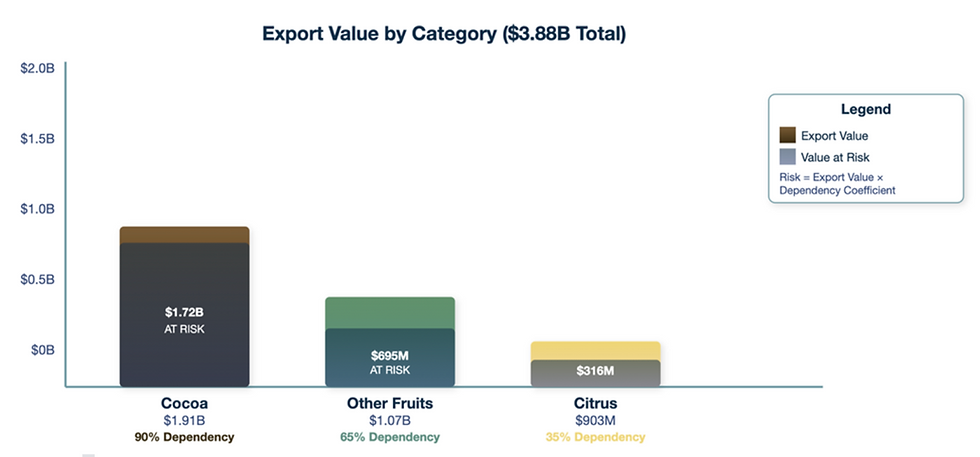Why Protecting Pollinators Matters to America’s Economy
- Aug 13, 2025
- 3 min read

Pollinators are the unseen workforce powering America’s agriculture, sustaining crops worth billions in export revenue. In 2021 alone, pollinator-dependent exports from the U.S. reached $16.17 billion. Yet, their populations are declining due to pesticide use, habitat loss, and climate change, threatening a share of the nation’s agricultural economy. Protecting pollinators is not only an environmental priority, but also an economic necessity.
Why it matters?
The decline of pollinators could threaten major U.S. export sectors and food security, affecting supply chains, job stability, and the livelihoods of millions of Americans.
The decline of pollinators creates vulnerabilities in global agricultural markets, as countries with healthier pollinator populations gain a competitive advantage and capture greater market share.
How Pollinators Fuel America's Economy
Did you know that some of America’s most valuable exports rely on the work of pollinators? In 2021, the United States led the world in pollinator-dependent agricultural exports, valued at $16.17 billion. This outpaces major export sectors like aircraft parts, beef, and medical equipment. But as pollinator populations decline, so does this hidden foundation of our agricultural and economic strength.

What is Pollination and Why are Pollinators Important
Pollination is nature’s way of helping plants reproduce, by which pollen is transferred from one flower’s anther to another flower’s stigma. More than 80% of all flowering plants and 75% of staple crops depend, at least in part, on animal pollinators.
Insects play a particularly critical role: roughly 80% of the world’s flowering plants rely on insect pollinators, such as bees, butterflies, and tiny midges. A decline in pollination would reduce plant populations and the genetic diversity necessary for ecosystems to adapt and remain resilient, particularly in the face of climate change.
The Hidden Value of Pollination
Responsible Alpha’s analysis focuses on three export categories—cocoa, citrus, and other fruits—which together represent $2.73 billion in direct export value at risk from pollinator declines. This is only part of the picture. Other major pollinator-dependent crops, including nuts, vegetables, and oilseeds, add up to the real economic exposure.

Among the three categories, cocoa is the most at risk, with $1.72 billion in export value directly threatened by pollinator decline. Cocoa flowers depend on pollination by specific midges, which no technology can yet replicate. The high concentration of the global cocoa market also amplifies this vulnerability.
In fruit crops, apples lead the way, with 90% dependent on pollinators and carrying high economic value. Washington State’s apple industry alone generates over $2 billion annually. Blueberries, cranberries, and stone fruits also rely heavily on pollinators, with their appearance, flavor, and size directly tied to effective pollination. While citrus is less dependent, pollinators still enhance its quality and boost its competitiveness in global markets.
Why Are Pollinators Declining
Pollinator populations are declining due to a combination of human-driven and environmental pressures. Pesticide use has created toxic agricultural landscapes that make survival and reproduction more difficult for pollinators. Intensive farming practices have destroyed habitats, wiping out the diverse floral resources that pollinators need to thrive. Climate change adds another layer of stress by disrupting the timing between plant blooms and pollinator emergence, threatening the delicate balance required for successful reproduction.
What is Next
Pollinators are not just ecological assets; they also drive a foundation of the U.S. economy that is far more valuable and vulnerable than most realize. Their decline threatens the food quality and quantity, agricultural jobs, and billions in export revenue. Countries that invest in pollinator protection will have a competitive advantage in the global marketplace. If the U.S. fails to act, it risks losing market share and economic stability in sectors worth far more than most people realize.





Comments